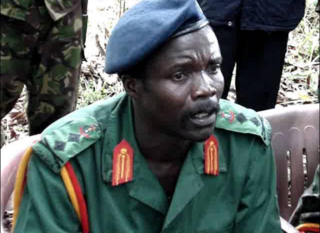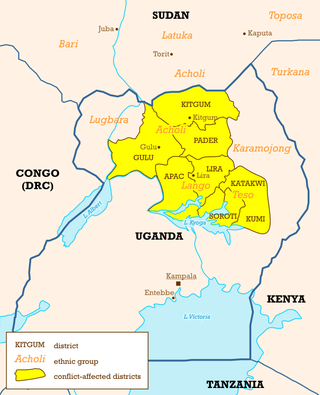
The Lord's Resistance Army insurgency is a conflict involving the Lord's Resistance Army against the government of Uganda. Following the Ugandan Civil War, militant Joseph Kony formed the Lord's Resistance Army and launched an insurgency against the newly installed President Yoweri Museveni. The stated goal was to establish a Christian state based on the Ten Commandments. Currently, there is low-level LRA activity in eastern areas of the Democratic Republic of the Congo and the Central African Republic. Kony proclaims himself the 'spokesperson' of God and a spirit medium.

Joseph Rao Kony is a Ugandan militant and warlord who founded the Lord's Resistance Army (LRA), designated as a terrorist group by the United Nations Peacekeepers, the European Union, and various other governments.

The period from 1986 to 1994 of the Lord's Resistance Army insurgency is the early history of the ongoing insurgency of the Lord's Resistance Army (LRA) rebel group in Uganda, which has been described as one of the most under-reported humanitarian crises in the world. The Lord's Resistance Army was formed in early 1987 out of the conflict following the successful rebellion of the National Resistance Army (NRA), though remained a relative small group through the counterinsurgency of the NRA. As the peace talks initiated by Minister Betty Bigombe failed Sudanese support to the LRA intensified the conflict.

The start of the period 1994 to 2002 of the Lord's Resistance Army insurgency in northern Uganda saw the conflict intensifying due to Sudanese support to the rebels. There was a peak of bloodshed in the mid-1990s and then a gradual subsiding of the conflict. Violence was renewed beginning with the offensive by the Uganda People's Defence Force in 2002.
The period from 2000 to 2006 of the Lord's Resistance Army insurgency in northern Uganda begins with the assault of the Uganda People's Defence Force (UPDF) upon LRA strongholds in South Sudan. This in turn led to a series of retaliatory attacks by the Lord's Resistance Army of an intensity not seen to since the mid-1990s. International awareness of the conflict gradually grew and in September 2005, the International Criminal Court issues warrants for the arrest of senior LRA commanders, including Joseph Kony.
Justine Odong Latek was a Ugandan brigadier who served in the Uganda National Liberation Army (UNLA) during the Ugandan Bush War and later led the Uganda People's Democratic Army (UPDA) during the 1986–1994 war in Uganda.

The Juba talks were a series of negotiations between the government of Uganda and the Lord's Resistance Army rebel group over the terms of a ceasefire and possible peace agreement. The talks, held in Juba, the capital of autonomous Southern Sudan, began in July 2006 and were mediated by Riek Machar, the Vice President of Southern Sudan. The talks, which had resulted in a ceasefire by September 2006, were described as the best chance ever for a negotiated settlement to the 20-year-old war. However, LRA leader Joseph Kony refused to sign the peace agreement in April 2008. Two months later, the LRA carried out an attack on a Southern Sudanese town, prompting the Government of Southern Sudan to officially withdraw from their mediation role.
The Atiak massacre occurred on April 20, 1995, when a group of estimated 300 Lord's Resistance Army soldiers led by Vincent Otti entered the northern Ugandan town of Atiak, Amuru District. After routing the UPDF and rounding up hundreds of civilians, the LRA announced, "you Acholi have refused to support us. We shall now teach you a lesson." The LRA then handpicked young boys and young girls from the rest, in order to conscript into their ranks and to use as sex slaves, and marched them into the bush. Most of the remaining 200–300 captives were executed by gunfire.

The Lord's Resistance Army (LRA) is a Christian extremist organization operating in Central Africa and East Africa. Its origins were in the Ugandan insurgency (1986–1994) against President Yoweri Museveni during which Joseph Rao Kony founded the LRA in 1987.

Betty Achan Ogwaro is a South Sudanese politician in the government of South Sudan. Betty Achan Ogwaro was the former and the first minister of Agriculture and Forestry in the Republic of South Sudan

Amuru District is a district in Northern Uganda. Like most Ugandan districts, it is named after its 'chief town', Amuru, where the district headquarters are located.

Kony 2012 is a 2012 American short documentary film produced by Invisible Children, Inc. The film's purpose was to make Ugandan cult leader, war criminal, and ICC fugitive Joseph Kony globally known so as to have him arrested by the end of 2012. The film was released on March 5, 2012, and spread virally, and the campaign was initially supported by various celebrities.
John Baptist Odama is a Ugandan Roman Catholic priest, who serves as the Metropolitan Archbishop of the Roman Catholic Archdiocese of Gulu, in Uganda, since 2 January 1999.
Opiyo Oloya is a Ugandan-born educator and author, living in Canada, currently Western University's Associate Vice President of Equity, Diversity and Inclusion. He wrote Child to Soldier published by the University of Toronto Press in 2013. The book deals with the experience of child soldiers recruited to the army of Joseph Kony.
Lucy Akello is a Ugandan social worker and politician, who served as the member of parliament for the Amuru District Women's Constituency in the 10th Parliament. She was elected back to the eleventh Parliament representing Amuru District under FDC political party. She is a member of the opposition Forum for Democratic Change (FDC), and she serves as the shadow minister for labour, gender and social development.

The Acholi people are a Nilotic ethnic group of Luo peoples, found in Magwi County in South Sudan and Northern Uganda, including the districts of Agago, Amuru, Gulu, Kitgum, Nwoya, Lamwo, Pader and Omoro District. The Acholi were estimated to number 2.3 million people and over 45,000 more were living in South Sudan in 2000.
Lilly Adong is a Ugandan politician and member of Parliament since 2011, she serves as a woman representative in the Parliament of Uganda for the Nwoya district.

From 1986 to 1994, a variety of rebel groups waged a civil war against the Ugandan government of President Yoweri Museveni. Most of the fighting took place in the country's north and east, although the western and central regions were also affected. The most important insurgent factions were the Uganda People's Democratic Army (UPDA), the Uganda People's Army (UPA), Alice Auma's Holy Spirit Movement (HSM), and Joseph Kony's army. Several smaller rebel factions and splinter groups of the larger movements waged their own campaigns; the rebels often clashed with each other. All belligerents, including the government, targeted civilians and committed human rights violations. In course of fighting that involved tens of thousands of troops, the Ugandan government was able to gradually defeat or contain most rebel factions. The operations in the north and east caused great destruction and resulted in high civilian casualties.
Betty Lalam is a Ugandan teacher and ex-abductee of the Lord's Resistance Army, She is a director for Gulu War Affected Training Center.
Sharon Balmoi Laker is a Ugandan politician. She is the district woman representative of Gulu district under the National Resistance Movement political party at the eleventh Parliament of Uganda.









